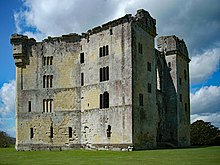| Sieges of Wardour Castle | |||||||
|---|---|---|---|---|---|---|---|
| Part of the First English Civil War | |||||||
 Ruins of Wardour Castle | |||||||
| |||||||
| Belligerents | |||||||
|
|
| ||||||
| Commanders and leaders | |||||||
|
First siege Henry Arundell, 3rd Baron Arundell of Wardour |
First siege Edmund Ludlow | ||||||
| Strength | |||||||
|
First siege 25 Second siege variable; up to one regiment |
First siege 1,300 Second siege 75 | ||||||
Location within Wiltshire | |||||||
Wardour Castle in Wiltshire, England, was besieged twice during the First English Civil War; once in May 1643, and then again between November 1643 and March 1644.
During the first siege, a Parliamentarian force of around 1,300 men led by Sir Edward Hungerford attacked the castle, which was the home of Thomas Arundell, 2nd Baron Arundell of Wardour, a prominent Catholic and Royalist. Arundell was absent, fighting for King Charles at the time of the attack, and the defence was led by his wife, Lady Blanche Arundell, in command of 25 soldiers. The siege began on 2 May, and lasted for a week before the Parliamentarians forced Lady Arundell to surrender on 8 May. The Parliamentarians garrisoned the castle with 75 men, led by Colonel Edmund Ludlow.
Henry Arundell, 3rd Baron Arundell of Wardour, the son of Thomas and Blanche, brought a Royalist force to reclaim the castle, and by November 1643 a tight blockade had been established. The castle was well-provisioned, and it was only when the Royalists exploded mines under the walls, creating large holes in the defences, that they forced the castle's surrender. The damage to the castle left it uninhabitable, and over 100 years later, the Arundell family commissioned New Wardour Castle to be built nearby.

